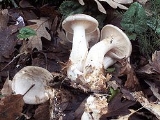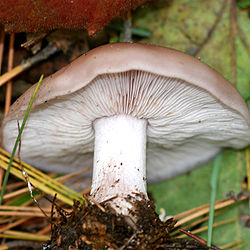
Clitocybe
Encyclopedia
Hundreds of species
of mushroom
s compose the fungus genus
Clitocybe. They are characterized by white, off-white, buff, cream, pink, or light-yellow spore
s, gills running down the stem
, and pale white to brown or lilac coloration. They are primarily saprotrophic, decomposing forest ground litter. There are estimated to be around 300 species in the widespread genus.
Clitocybe means sloping head.
A few members of the genus are considered edible
; many others are poisonous, containing the toxin muscarine
among others. Distinguishing individual species of Clitocybe is generally prohibitively difficult to non-experts, requiring the analysis of microscopic characters. Therefore, with the exception of a few charismatic and readily identified members, Clitocybe mushrooms are rarely collected for consumption.
Recent molecular work has shown the genus to be polyphyletic, with many members seemingly distantly related and other fungi, such as the field blewit and wood blewit
, now known as Clitocybe saeva and C. nuda respectively, are more closely related. As C. nebularis
is the type species, those most distantly related to it would be likely to be reclassified in the future.
In a 2003 paper, Finnish mycologist Harri Harmaja proposed C. geotropa and twelve other Clitocybe species be split off into a new genus Infundibulicybe
on the basis of spore properties. He also reclassified C. clavipes
in the genus Ampulloclitocybe
, that genus name taking precedence over his own proposal Clavicybe.
from Japan, and Clitocybe amoenolens
from France, has led to several cases of mushroom-induced erythromelalgia
which lasted from 8 days to 5 months.
 Many small Clitocybe species contain the toxin muscarine
Many small Clitocybe species contain the toxin muscarine
, which was originally found in small amounts in the famous fly agaric. However, the small white Clitocybe species contain muscarine in dangerous amounts, and two species in particular, the closely related Clitocybe dealbata and Clitocybe rivolusa, contain muscarine in deadly amounts, and deaths have been recorded for eating those two Clitocybe species.
The bioluminescent jack o'lantern mushroom (Omphalotus olearius) was formerly placed in this genus as Clitocybe illudens.
Species
In biology, a species is one of the basic units of biological classification and a taxonomic rank. A species is often defined as a group of organisms capable of interbreeding and producing fertile offspring. While in many cases this definition is adequate, more precise or differing measures are...
of mushroom
Mushroom
A mushroom is the fleshy, spore-bearing fruiting body of a fungus, typically produced above ground on soil or on its food source. The standard for the name "mushroom" is the cultivated white button mushroom, Agaricus bisporus; hence the word "mushroom" is most often applied to those fungi that...
s compose the fungus genus
Genus
In biology, a genus is a low-level taxonomic rank used in the biological classification of living and fossil organisms, which is an example of definition by genus and differentia...
Clitocybe. They are characterized by white, off-white, buff, cream, pink, or light-yellow spore
Spore
In biology, a spore is a reproductive structure that is adapted for dispersal and surviving for extended periods of time in unfavorable conditions. Spores form part of the life cycles of many bacteria, plants, algae, fungi and some protozoa. According to scientist Dr...
s, gills running down the stem
Stipe (mycology)
thumb|150px|right|Diagram of a [[basidiomycete]] stipe with an [[annulus |annulus]] and [[volva |volva]]In mycology a stipe refers to the stem or stalk-like feature supporting the cap of a mushroom. Like all tissues of the mushroom other than the hymenium, the stipe is composed of sterile hyphal...
, and pale white to brown or lilac coloration. They are primarily saprotrophic, decomposing forest ground litter. There are estimated to be around 300 species in the widespread genus.
Clitocybe means sloping head.
A few members of the genus are considered edible
Edible mushroom
Edible mushrooms are the fleshy and edible fruiting bodies of several species of fungi. Mushrooms belong to the macrofungi, because their fruiting structures are large enough to be seen with the naked eye. They can appear either below ground or above ground where they may be picked by hand...
; many others are poisonous, containing the toxin muscarine
Muscarine
Muscarine, L--muscarine, or muscarin is a natural product found in certain mushrooms, particularly in Inocybe and Clitocybe species, such as the deadly C. dealbata. Mushrooms in the genera Entoloma and Mycena have also been found to contain levels of muscarine which can be dangerous if ingested...
among others. Distinguishing individual species of Clitocybe is generally prohibitively difficult to non-experts, requiring the analysis of microscopic characters. Therefore, with the exception of a few charismatic and readily identified members, Clitocybe mushrooms are rarely collected for consumption.
Recent molecular work has shown the genus to be polyphyletic, with many members seemingly distantly related and other fungi, such as the field blewit and wood blewit
Wood blewit
Blewit refers to two closely related species of edible agarics in the genus Lepista, the wood blewit and the field blewit or blue-leg...
, now known as Clitocybe saeva and C. nuda respectively, are more closely related. As C. nebularis
Clitocybe nebularis
Clitocybe nebularis or Lepista nebularis, commonly known as the clouded agaric or cloud funnel, is an abundant gilled fungus which appears both in conifer-dominated forests and broad-leaved woodland in Europe and North America...
is the type species, those most distantly related to it would be likely to be reclassified in the future.
In a 2003 paper, Finnish mycologist Harri Harmaja proposed C. geotropa and twelve other Clitocybe species be split off into a new genus Infundibulicybe
Infundibulicybe
Infundibulicybe is a genus of fungi in the Tricholomataceae. The widespread genus contains 13 species.-Species:*I. altaica*I. bresadolana*I. catinus*I. costata*I. dryadum*I. geotropa*I. gibba*I. gigas...
on the basis of spore properties. He also reclassified C. clavipes
Clitocybe clavipes
Ampulloclitocybe clavipes, commonly known as the club-footed clitocybe, is a species of gilled mushroom from Europe.Although considered edible, antabuse-like reactions have been reported after consumption of alcohol after eating this mushroom...
in the genus Ampulloclitocybe
Ampulloclitocybe
Ampulloclitocybe is a genus of three species of fungi with a widespread distribution....
, that genus name taking precedence over his own proposal Clavicybe.
Toxicity
The consumption of two species, Clitocybe acromelalgaClitocybe acromelalga
Clitocybe acromelalga is a basidiomycete fungus of the large genus Clitocybe found in Japan. It was discovered to be poisonous in 1918, when symptoms of occurred within 3 days of consumption. It had been mistaken for the edible blewit Lepista inversa.Consumption of a related species, C. amoenolens...
from Japan, and Clitocybe amoenolens
Clitocybe amoenolens
Clitocybe amoenolens, commonly known as the paralysis funnel, is an agaric fungus of the large genus Clitocybe. It was originally described from Morocco in 1975 by the French mycologist Malençon. It was discovered to be poisonous after several people had consumed specimens all found in the alpine...
from France, has led to several cases of mushroom-induced erythromelalgia
Erythromelalgia
Erythromelalgia, also known as Mitchell's disease , acromelalgia, red neuralgia, or erythermalgia, is a rare neurovascular peripheral pain disorder in which blood vessels, usually in the lower extremities , are episodically blocked , then become hyperemic and inflamed...
which lasted from 8 days to 5 months.

Muscarine
Muscarine, L--muscarine, or muscarin is a natural product found in certain mushrooms, particularly in Inocybe and Clitocybe species, such as the deadly C. dealbata. Mushrooms in the genera Entoloma and Mycena have also been found to contain levels of muscarine which can be dangerous if ingested...
, which was originally found in small amounts in the famous fly agaric. However, the small white Clitocybe species contain muscarine in dangerous amounts, and two species in particular, the closely related Clitocybe dealbata and Clitocybe rivolusa, contain muscarine in deadly amounts, and deaths have been recorded for eating those two Clitocybe species.
Selected species
- Clitocybe acromelalgaClitocybe acromelalgaClitocybe acromelalga is a basidiomycete fungus of the large genus Clitocybe found in Japan. It was discovered to be poisonous in 1918, when symptoms of occurred within 3 days of consumption. It had been mistaken for the edible blewit Lepista inversa.Consumption of a related species, C. amoenolens...
(Japan) - Clitocybe alexandri
- Clitocybe amoenolensClitocybe amoenolensClitocybe amoenolens, commonly known as the paralysis funnel, is an agaric fungus of the large genus Clitocybe. It was originally described from Morocco in 1975 by the French mycologist Malençon. It was discovered to be poisonous after several people had consumed specimens all found in the alpine...
— poisonous bamboo mushroom (France) - Clitocybe brumalisClitocybe brumalisClitocybe brumalis commonly known as the Winter Funnel Cap is an inedible mushroom of the genus Clitocybe. It grows in deciduous and coniferous woodland, only in winter; sometimes even under snow.-Description:...
— Winter Funnel Cap - Clitocybe candicans
- Clitocybe candida
- Clitocybe cerussata
- Clitocybe clavipesClitocybe clavipesAmpulloclitocybe clavipes, commonly known as the club-footed clitocybe, is a species of gilled mushroom from Europe.Although considered edible, antabuse-like reactions have been reported after consumption of alcohol after eating this mushroom...
— may be edible but poisonous when consumed in conjunction with alcohol - Clitocybe dealbataClitocybe dealbataClitocybe dealbata, also known as the ivory funnel, is a small white funnel-shaped toadstool widely found in lawns, meadows and other grassy areas in Europe and North America. Also known as the sweating mushroom, it derives this name from the symptoms of poisoning...
— ivory funnel, sweating mushroom (Europe), poisonous - Clitocybe ditopus
- Clitocybe dilata
- Clitocybe eccentrica
- Clitocybe entoloma
- Clitocybe eucalyptorum
- Clitocybe flaccida
- Clitocybe fragrans '— fragrant funnel
- Clitocybe geotropa— trooping funnel, monk's head agaric
- Clitocybe glacialisClitocybe glacialisClitocybe glacialis is a species of mushroom in the family Tricholomataceae. Formerly known as Lyophyllum montanum, this is a snowbank mushroom, always associated with melting snow along snowbanks...
- Clitocybe glutiniceps
- Clitocybe maxima
- Clitocybe nebularisClitocybe nebularisClitocybe nebularis or Lepista nebularis, commonly known as the clouded agaric or cloud funnel, is an abundant gilled fungus which appears both in conifer-dominated forests and broad-leaved woodland in Europe and North America...
— clouded agaric - considered edible by some, though causes gastric upset in many people - Clitocybe nudaClitocybe nudaClitocybe nuda , is an edible mushroom, found in both coniferous and deciduous woodlands. It is a fairly distinctive mushroom which is widely eaten, though there is some caution about edibility...
— Wood blewit — a common edible distinguished in part by its lilac hue - Clitocybe odora — Aniseed toadstool; grows near birch trees, but can be easily mistaken for poisonous ones mainly because of its appearance
- Clitocybe parasiticaClitocybe parasiticaClitocybe parasitica is a plant pathogen.- External links :* *...
- Clitocybe rivulosaClitocybe rivulosaClitocybe rivulosa, commonly known as the false champignon or fool's funnel, is a poisonous basidiomycete fungus of the large genus Clitocybe. One of several species similar in appearance, it is a small white funnel-shaped toadstool widely found in lawns, meadows and other grassy areas in Europe...
- Fool's Funnel (Europe, North America) - Clitocybe sclerotoidea
- Clitocybe truncicola
- Clitocybe vibecinaClitocybe vibecinaClitocybe vibecina is a common, inedible mushroom of the genus Clitocybe. It often grows in rings on needle litter, usually late in the year.-Description:...
The bioluminescent jack o'lantern mushroom (Omphalotus olearius) was formerly placed in this genus as Clitocybe illudens.
See also
- Mushroom huntingMushroom huntingMushroom hunting, mushrooming, mushroom picking, and similar terms describe the activity of gathering mushrooms in the wild, typically for eating...
- Mushroom poisoningMushroom poisoningMushroom poisoning refers to harmful effects from ingestion of toxic substances present in a mushroom. These symptoms can vary from slight gastrointestinal discomfort to death. The toxins present are secondary metabolites produced in specific biochemical pathways in the fungal cells...
- List of Tricholomataceae genera

